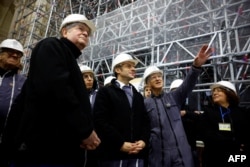This website uses cookies so that we can provide you with the best user experience possible. Cookie information is stored in your browser and performs functions such as recognising you when you return to our website and helping our team to understand which sections of the website you find most interesting and useful.
 Paris —
Paris —
With bleak December weather gripping the French capital and world attention dominated by the bloody conflict in Gaza, the slow reemergence of Paris’ fire-battered Notre Dame cathedral is a welcome Christmas present.
A golden rooster — a potent symbol of light in Christianity and of France — once again sits atop the cathedral’s reconstructed spire, replacing one that fell into the 2019 blaze which nearly demolished the edifice. By December 8, 2024, authorities pledge, Notre Dame will reopen to the public.
“It’s extraordinary when you see it up over Notre Dame,” the cathedral’s former chief architect, Benjamin Mouton, said of the spire, which — like most of the rest of the reconstruction — replicates the one before the blaze.
“It has a power,” he added in an interview. “It’s an absolute work of art.”
Notre Dame’s latest reincarnation — the medieval cathedral has weathered other setbacks over the centuries — has not been without a dose of drama and controversy.
In August, General Jean-Louis Georgelin, who oversaw Notre Dame’s reconstruction effort, died abruptly while hiking in the Pyrenees. He was replaced by a close associate, Philippe Jost.
A decision to cover the spire in lead, as it had been before, stirred debate. And more than 100,000 people signed a petition against replacing half-a-dozen traditional stained-glass windows with modern iterations.
But for many visitors and Parisians, Notre Dame’s restoration brings a sense of joy.
Maryse Pinheiro, a retired teacher living in northern Paris, gazed at the cathedral one recent evening, as it was lit up in tiny white lights.
“It seemed like it was in preparation for a renaissance,” she said.
Tourist Thomas Kelly Hamilton from Washington visited Notre Dame during the first day of his stay in Paris.
“It just catches your eye, particularly the scaffolding for the spire, and you can see the cross at the top,” he said. “It was kind of inspirational to see everyone hard at work — working like bees.”
Restoring Notre Dame has been a massive feat, involving roughly a thousand workers on any given day, including specialized craftsmen, and artisanal workshops across France and beyond.
President Emmanuel Macron initially pushed for its reopening by the Paris summer Olympics next July, but reconstruction was slowed notably due to decontamination work from the lead that melted during the fire.
At a ceremony earlier this month, a long list of the artisans’ names, along with holy relics saved from the fire, were inserted into the bowels of the rooster before it was affixed to the spire. The previous rooster, too damaged to be reused, is on display at a Paris exhibit on Notre Dame.
"I believe that all this work is thanks to God,” Monseigneur Laurent Ulrich, archbishop of Paris, said at the event. “In other words, I look at this work and say that there has been much intelligence, much strength, much perseverance, much desire to succeed.”
A rocky past
Considered a jewel of medieval Gothic architecture, the 12th century cathedral has had a rocky history. It was looted and vandalized during the French revolution, and later sold at auction.
When Napoleon came to power, he scrapped the sale and ordered that the building be redecorated for his coronation. The current edifice, which replaced an earlier one destroyed by fire, also saw another blaze in the 13th century.
Investigators are still determining the origins of the April 2019 fire that swept through the cathedral, leaving French and tourists in disbelief. Many were in tears as they watched the steeple fall into the inferno. This time, the cathedral will be equipped by a special firefighting system aimed at avoiding another blaze.
After much debate, authorities chose to replicate the spire built by 19th century architect Eugene Viollet-Le-Duc. But President Macron has called for a modern twist to Notre Dame — by replacing half a dozen stained-glass windows with contemporary ones.
“To break with the architecture seems to me to be an error,” says Mouton, who added his name to the petition against the move.
The windows to be replaced were not damaged in the fire, the former architect added. “And they are of great quality.”



 Africana55 Radio
Africana55 Radio 

